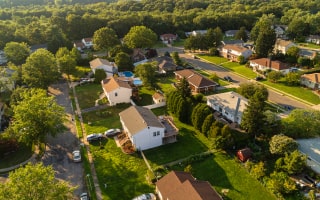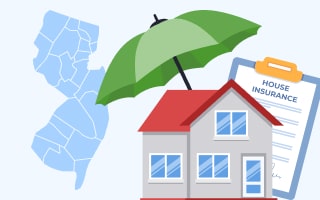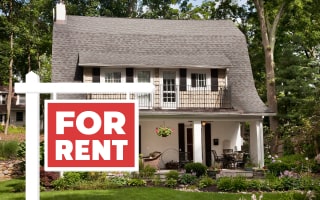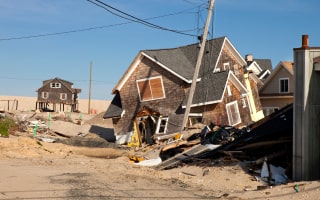Homeowners Insurance in New Jersey

Visitors to New Jersey flock to Atlantic City, Ellis Island, or Liberty State Park. Residents, however must deal with mid-Atlantic issues like hurricanes, violent snow storms, flooding, and other types of windstorms damaging property. These natural disasters cause problems for homeowners and result in costly claims to insurance providers. Since 1953, New Jersey has had 50 federally declared natural disasters, and the rate of disasters per 1 million people is 5.36, which is lower than that of many states.
Along with damage from wind, storms, and floods, New Jersey residents also file claims for tree damage, water damage caused by burst pipes, faulty water heaters, and heavy rainfall. Some other common home insurance claims in New Jersey are for fires, theft, vandalism, and liability issues.
The state of New Jersey does not require homeowners insurance, but experts strongly suggest that anyone who owns property should have at least some coverage. However, if you take out a mortgage to buy the house in New Jersey, your lender or bank will require you to carry specific coverage limits on the property for the life of the loan.
As of September 2024, the national average cost of homeowners insurance is $2,728 per year. New Jersey homeowners pay an average of $1,069 annually for home insurance, less than half the national average.
Types of Homeowner Insurance Coverage Available in New Jersey
Each state has different natural and unnatural threats to property. Various providers offer some types of coverage to residents within those states based on the dangers and risk factors. The available types of coverage in New Jersey include:
-
Dwelling: Dwelling coverage protects the structure of your home and pays to repair or replace it after a disaster. It covers things like the roof, foundation, walls, wiring, and plumbing.
-
Other Structures: Other structures coverage pays to replace detached items like garages, sheds, fences, pools, hot tubs, etc., after a qualifying event.
-
Personal Property: Personal property coverage pays to replace your personal belongings after they are stolen or lost in a covered peril.
-
Medical Payments: If someone is injured on your property, medical payments coverage will pay their medical bills up to a specific limit.
-
Liability: Liability insurance pays your legal bills if anyone is hurt on your property and sues you for damages.
-
Additional Living Expenses (ALE): When you must leave your home while it is repaired due to damage, ALE insurance will pay for your living expenses (food, lodging, pet boarding, furniture rental, travel, etc.).
Homeowners may also consider flood insurance and/or an umbrella policy to pick up where others leave off.
FEMA (Federal Emergency Management Agency) manages the National Flood Insurance Program (NFIP) through a network of 50 providers across the U.S.
Since most homeowners insurance does not cover floods, this supplemental coverage can repair damage and replace items after a flood. Depending on the options you choose, it can cover the building and/or your personal belongings. This program is available to homeowners, renters, and businesses. Learn more about the program on FEMA's website.
Home Insurance and Natural Disasters
Climate change is making the entire homeowners insurance industry nervous. As more violent storms become commonplace, even in historically "mild weather" regions, insurers combat the deluge of claims by increasing rates, limiting coverage, and canceling expensive clients. Turbulent weather is the number one factor driving insurance rate hikes. Over the past five years, rates have increased by 34% and, in some places, as high as 60%. Rates in New Jersey have increased by only 15.4%.
New Jersey residents must deal with hurricanes, heavy winter storms, floods, and wildfires destroying land and property. Fire claims average $77,340 per incident. Insurers pay an average of $11,650 for water and freezing damage and an average of $11,695 for wind and hail claims. From 2015 to 2019, insurance providers lost a total of $1,171,429,400. From 1980 to 2024, New Jersey had 69 billion-dollar disasters. In 2023, New Jersey had 13 tornadoes. In 2022, however, the state experienced 1,165 wildfires, destroying 15,532 acres of land.
How Can I Save on Homeowner Insurance Premiums in New Jersey?
Homeowners insurance rates are rising steadily every year making it essential for property owners to find ways to save money. The best way to do that is to understand the factors that impact home insurance costs. The things that affect your home insurance the most include:
-
Location: Location is the most crucial factor. If you live in a dangerous area due to crime or frequent disasters, you will pay much more than you would if you live in a safer area.
-
Size of Your House: Size also matters regarding rates. The larger the house, the more it will cost to rebuild after an event, so your insurance will also be more expensive.
-
Condition and Age of Your Home: Homes in good condition that have been maintained well will cost less to insure than those in disrepair. Older homes cost more to insure than younger homes.
-
Construction Materials: The materials used to build your house also factor in. The more expensive and rare the materials are, the higher your rates will be.
-
Coverage Amount: The more coverage you have, the higher your annual premiums will be.
-
Claims History: People who have filed many claims will pay more for home insurance than those with a clean claims history.
-
Your Deductible: The higher your deductible, the lower your rates. Conversely, the lower your deductible, the higher your rates.
-
Your Credit Score: People with high credit scores pay less for home insurance than those with low scores.
-
Pets: Some pets are considered dangerous (even some breeds of dogs), and insurance providers will charge you more.
-
Risk Factors: If you have risk factors like fireplaces, a hot tub, a pool, or other "attractive nuisances", your insurance rates will be higher.
-
Owned/Financed: If you finance your home, your insurance carrier will dictate your coverage limits, and you will pay more than if you choose your coverage yourself.
Follow the tips below to save on your homeowners insurance in New Jersey:
- Avoid High Risks: You can lower your insurance rates by ridding your home of excess risks.
- Boost Your Credit: Improve your credit score and ask your agent to reevaluate your insurance premiums.
- Ask for Recommendations: Ask friends, family, and colleagues for recommendations before picking an insurance carrier.
- Raise Your Deductible: Raise your deductible as high as comfortably possible to balance cost with coverage.
- Disaster-Resistant Upgrades: Make disaster-resistant updates that make your home more resilient and help lower your rates.
- Ask for Discounts: Ask your insurance carrier for any discounts that apply to you.
- Bundle Your Policies: Bundle your policies together to save money on your premiums.
- Improve Security: Install a security system to make your home safer from vandalism and theft, and your insurer should reduce your rates.
- Don't File Small Claims: Avoid filing small claims; you could save on your insurance.
Home Insurance Discounts in New Jersey
Home insurance is a policy designed to protect your home in the event of a disaster. After a qualifying event, you file a claim, and the insurance company pays to repair or replace your home back to its original condition. Most policies also include personal property coverage, liability insurance, medical payments, other structures, and loss of use.
You can easily get a policy once you decide which company to use. You can apply online through the company website or by calling their 800 number. You can also contact a local insurance agent and work with them to determine the best coverage limits for your situation. After you find a carrier, you must pay the first year in advance. After that, you can pay through your mortgage escrow or once a year.
The most common home insurance discounts offered by reputable firms include:
- Senior Discount: People of a certain age often get discounts from their insurance providers.
- Military Discount: Most firms will offer discounted rates for active military personnel and veterans.
- Occupational Discount: Some occupations, like teachers, firefighters, and government workers, earn insurance discounts.
- Bundling Discount: Most firms will discount your premiums when you bundle multiple policies together.
- Claims-Free Discount: Stay claims-free as long as possible and earn ongoing discounts through your insurance carrier.
- Loyalty Discount: Remain a loyal customer; your insurance provider may discount your rates more each year.
- Quote in Advance Discount: Get a quote long before you need it, and you can earn a discount.
- Paperless Discount: Go paperless for statements, and you will get a small discount.
- Autopay Discount: Many firms also offer small discounts for people who sign up for autopayments.
- Fire Safety Discount: Install fire safety features in your home, such as smoke alarms, sprinklers, and fire extinguishers, to lower your fire risk and earn discounts.
- New Home Discount: Newer homes earn up to 40% off home insurance.
Common Rates Offer by Homeowners Insurance Firms
Newer homes cost much less to insure, sometimes as much as 40% less. Even five-year-old homes cost as much as 26% less than older homes to insure. New homes in New Jersey cost an average of $777 per year for insurance. Your actual price will be affected by many things, like the age, condition, and size of the home, your credit score, claims history, and other factors.
Top 10 Home Insurance Firms in New Jersey and Average New Home Discount
| Company | % savings |
|---|---|
| Nationwide | 76% |
| State Farm | 51% |
| Chubb | N/A |
| Travelers | 63% |
| Liberty Mutual | N/A |
| Allstate | 47% |
| USAA | 54% |
| Amica Mutual Insurance | N/A |
| Lemonade | N/A |
| Progressive | N/A |
Home Insurance and Renovations in New Jersey

Home improvements can turn a drab abode into a palace but can also dramatically impact your home insurance rates. Some home renovations increase your risk or value and increase your rates. Other upgrades may make your home safer and reduce risk and rates. Still, others can do both simultaneously, canceling out any effect on your premiums.
![]() Home Renovations that Increase Rates
Home Renovations that Increase Rates
Some home renovations that increase your rates include:
- Adding an Extension: Whenever you add an extension to your house, you add space, meaning more value and higher rates.
- Adding a Tree House: While a tree house may be exciting for your kids, insurance carriers consider it an "attractive nuisance", and your rates will increase.
- Solar Panels: Solar panels can help you save a bundle on electricity, but they are expensive to replace and will increase your insurance premiums.
![]() Home Renovations that Decrease Rates
Home Renovations that Decrease Rates
Some home renovations that increase your rates include:
- Hurricane Straps/Ties: Adding hurricane straps, ties, or shatterproof windows can help your house be safer and may lower your rates.
- Water Alarms/Shut-Off Devices: Water can be very damaging and costly. Installing water alarms or shut-off devices can prevent claims and reduce insurance costs.
- Home Security: Install a high-grade home security system to help keep your home safe from vandalism and theft, and your insurer will reduce your premiums.
If you replace your home's siding, you could reduce your rates, but unless you use luxury or expensive materials, which could actually raise them.
Homeowners insurance does not cover regular maintenance or selective upgrades. It only pays for repairs or replacement of a house after a qualifying event. If, during renovations, someone gets hurt or steals your stuff, those are covered by your home insurance policy. Home insurance does not cover pest infestations, rodents, or animal damage.
It's important to speak with your insurance agent before updating your home. Your agent can help you understand the full impact of the renovations on your coverage and rates and decide what, if anything, needs to change.
New Jersey Renters' Insurance

Renters insurance is for people who rent rather than buy homes. It protects your personal belongings and includes liability protection, medical payments, and loss of use coverage. Renters insurance does not include any dwelling coverage to protect the structure. That must be covered by your landlord or the owner of the property. Some covered perils with renters insurance include:
-
Fire
-
Smoke
-
Lightning
-
Explosions
-
Windstorms
-
Vandalism
-
Theft
-
Water Damage by Burst Pipes
Some of the things that renters insurance will replace include:
-
Furniture
-
Clothing
-
Small Appliances
-
Electronics
-
Sports Equipment
-
Bath Items
-
Bedding
Each policy has strict limits, so expensive items like collectibles, art, jewelry, and furs may not be covered.
The three following factors affect how insurers price renters insurance:
-
Location: Where you live affects your premiums. If you live in a rural area or the suburbs with low crime, you will pay less than if you live in the city or an area with frequent natural disasters.
-
Coverage Amounts: The more coverage you buy, the higher your insurance rates will be.
-
Number of Units: The higher the number of units, the less you will pay for home insurance.
The typical renter in New Jersey pays an average of $11.79 per month, while the national average for renters insurance is $15-$20 per month.
Condo Insurance in New Jersey

People who buy condos also need protection for their homes. Condo insurance, or HO-6, is designed specifically for condo owner's unique needs. Condo associations have their own master policy, which covers the dwelling structure and will rebuild and restore each building after a qualifying event. The issue is that when they rebuild, they will restore each unit to its original condition (when it was first built). Most condo owners have upgraded their kitchens, baths, flooring, fixtures, and appliances. That is where HO-6 insurance comes in, making up the difference and restoring the interior to its most current condition. Condo insurance also includes personal property, liability protection, medical payments, loss assessment, and loss of use.
Unlike renters insurance, condo insurance has some dwelling coverage but only applies to the condo's interior. Plus, the liability portion only protects you if the person is hurt inside the condo, not outside or on common grounds.
Condo insurance kicks in after a covered event like smoke, fire, theft, vandalism, or windstorm. Some of the items that will be replaced/restored are:
- Appliances
- Interior Walls
- Wiring
- Plumbing
- Furniture
- Flooring
- Light Fixtures
- Countertops
- Cabinets
- Personal Property
Condo owners in New Jersey pay about $445/year or $37/month for condo insurance. The national average is $625/year with $60,000 of personal property coverage, $300,000 in liability protection, and a $1,000 deductible.
Some ways to save on your condo insurance expenses include:
- Increase Your Deductible
- Make Your Home More Secure
- Ask for Discounts
- Don't File Small Claims
- Improve Your Credit Score
- Bundle Your Policies Together
- Eliminate Risks
- Shop Around for Providers
New Jersey Home Insurance Market
In most of the country, the insurance industry is in a free fall, with losses piling up and providers going out of business. Insurers in New Jersey, however, have remained profitable over the past ten years despite the many claims. Those profits have dwindled significantly in recent years and may continue to do so until finally turning into losses.
Although New Jersey is a pretty safe state, it does experience hurricanes, crazy snowstorms, flooding, and wildfires. All of these events damage property and can result in costly claims. If global warming continues and these trends prevail, insurance providers may have to take steps to slow the bleeding, like limiting coverage options and eliminating costly clients.
Each state regulates home insurance providers within their borders. They delegate this responsibility to a single entity that monitors providers and rates, ensuring fairness and legality. They also investigate customer complaints and punish those who violate the rules. In New Jersey, that agency is the New Jersey Department of Banking and Insurance, located at 20 West State Street, PO Box 325, Trenton, NJ 08625.
Homeowners Insurance Guide
- Homeowners Insurance in New Jersey
- Types of Homeowner Insurance Coverage Available in New Jersey
- Home Insurance and Natural Disasters
- How Can I Save on Homeowner Insurance Premiums in New Jersey?
- Home Insurance Discounts in New Jersey
- Home Insurance and Renovations in New Jersey
- New Jersey Renters' Insurance
- Condo Insurance in New Jersey
- New Jersey Home Insurance Market
Instant Access to New Jersey Property Records
- Owner(s)
- Deed Records
- Loans & Liens
- Values
- Taxes
- Building Permits
- Purchase History
- Property Details
- And More!
Homeowners Insurance Guide
- Homeowners Insurance in New Jersey
- Types of Homeowner Insurance Coverage Available in New Jersey
- Home Insurance and Natural Disasters
- How Can I Save on Homeowner Insurance Premiums in New Jersey?
- Home Insurance Discounts in New Jersey
- Home Insurance and Renovations in New Jersey
- New Jersey Renters' Insurance
- Condo Insurance in New Jersey
- New Jersey Home Insurance Market